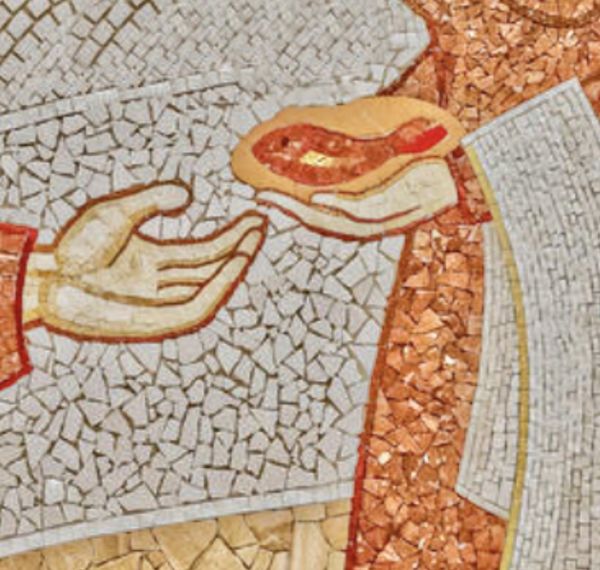In today's passage Jesus upsets the mind-sets of the Jews who wonder how he can give them to eat his body and drink his blood.
Francis, endowed by Grace with extraordinary charisms, understood all this well.
In his simplicity he was a great lover of the Eucharist, to which he dedicated a special letter: 'Letter to all clerics on the reverence of the Body of the Lord'.
In it, among other things, we read:
"For we possess and see bodily nothing in this world of the Most High himself, except the body and blood, the names and words by which we were created and redeemed 'from death to life'" (FF 207a).
And again the Sources inform about Francis' devotion to the Body and Blood of the Lord.
"He was burning with love in every fibre of his being for the sacrament of the Body of the Lord, filled with awe beyond measure at such benevolent deigning and most generous charity [...] being filled with reverence for this venerable sacrament, he offered the sacrifice of all his limbs, and, when he received the immolated Lamb, he immolated his spirit in that fire, which always burned on the altar of his heart [...].
One day he wanted to send the brothers into the world with precious pyxes, so that they might place the price of redemption in the most worthy place possible, wherever they saw it kept with little decorum" (FF 789).
Clare also yearned to receive the living Bread descended from heaven with great devotion and recollection:
"When then he was about to receive the Body of the Lord, he first shed hot tears and, approaching then with trembling, feared Him who is hidden in the Sacrament no less than the Sovereign of heaven and earth" (FF 3210).
And again, during his long stay he devoted himself even more devoutly to the Eucharist.
According to the Legend:
"In that grave illness which confined her to the bedside, she had herself lifted up and supported at the back with supports; and, while sitting, she spun very delicate fabrics.
From these she made more than fifty pairs of corporals and, enclosing them in silk or purple envelopes, she destined them for various churches throughout the plain and the mountains of Assisi" (FF 3209).
The life of these two Poor Men was an unceasing Eucharistic sacrifice for the benefit of humanity, in unity with Jesus.
Their every gesture was bread broken and blood shed for every needy creature.
Living in poverty and simplicity in daily life, she became bread for all.
«He who chews my flesh and drinks my blood has the Life of the Eternal One» (Jn 6:54)
Friday of the 3rd wk. in Easter (Jn 6,52-59)












